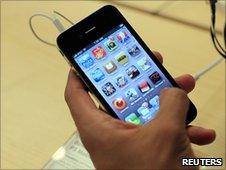Facebook eyes mobile phones to drive Russian expansion
- Published
When it comes to social networks, Russians have traditionally overwhelmingly favoured local services.
It is a situation which has left global market leader Facebook playing catch up - trailing Russia's number one social network, Vkontakte, by tens of millions of users.
Indeed only last month, Mark Zuckerberg, the founder and chief executive of the US firm, named Russia among only a few countries where Facebook did not hold pole position.
Now it has set out an approach it hopes will allow it to close that gap: tapping into the mobile phone.
Reducing roubles
For Facebook, trying to lure customers through their mobiles is about generating new users in the one of the world's most attractive emerging markets.
And the Russian mobile phone operators stand to gain too. They hope that growth for Facebook will help them raise mobile internet awareness, attract new users and ultimately increase revenues as more people use data services on their handset.
The country's mobile industry differs significantly from most Western markets, with more than 90% of its customer base made up of pre-pay users.
It means that most Russians pay for every call they make, every text they send and every piece of data they send or receive - all on top of buying a phone handset with their own money.
This has created a real consumer awareness of the cost of using a mobile phone - every action causing roubles in their account to trickle away.
The solution from Facebook and the country's mobile operators has been to promote the social network's text-only website, Facebook Zero. And to make accessing it absolutely free.

For years, Russian networks were rapidly building their customer base
Russia is not the only market where Facebook has launched its free text version. Dozens of operators around the world do not charge their customers for visiting Facebook Zero.
However, once users click on an external link or open a picture, for example, the meter will start running, and start to rack up data charges.
It is a model that would not bring the necessary results in countries where many users have phone contracts with included data usage.
In the UK, for example, phone network O2, which has been offering iPhones since 2007, says that about 46% of its mobile customer base were on contracts, as opposed to pay-as-you-go. For T-Mobile UK, the figure stands at about 25%.
'Customer rush'
There are several reasons why Russians are predominantly pre-pay customers.
One is the lack of credit history needed to get a mobile contract with a subsidised phone. Many people in Russia do not have debit or credit cards, and consumer credit ratings have only really started gaining prominence in recent years.
Another reason is the way the market developed in the mid-2000s when mobile operators enjoyed annual revenue growth of between 20% and 40% as they made it as easier to own a mobile by pushing the pre-pay business model.

Many Russians are ready to spend money on new gadgets
"There was a rush to get as many new customers as possible, and there was no time to think of anything else," says Anton Pogrebinsky, a partner at AC&M Consulting in Moscow.
Figures from Mobile Research Group in Moscow suggest the average amount of revenue per customer made by phone operators is three times lower in Russia than in Europe, though, says its head of analysis Eldar Murtazin, "it has been growing."
Now, as the market is more saturated and firms can attract fewer new customers, they are pinning their hopes on other ways of generating more cash.
A key one of these is offering value added services (VAS) to users which include data transfers of all types - from sending pictures and e-mails to accessing the internet.
Status symbol
But in order for customers to be prepared to pay for data transfers, they need to enjoy their mobile internet experience.
Leading Russian mobile operators have finally started building and expanding their 3G networks after delays caused by disputes about who should do it and how.
At the beginning of the year, about 16% of Russian mobile customers had bought 3G phones, at an average price of $276 (£183), according to research group MForum Analytics.
As many Russians see phones as status symbols, people often spend a significant amount of money on latest models, even if they have to obtain them abroad.
For example, Mr Murtazin estimates that by the time Apple officially launched its iPhone in Russia - more than a year after the phone hit Western markets - there were already about 500,000 iPhones in use in the country.
Loyalty
In Russia, selling phones, SIM cards and mobile phone plans are largely different businesses, thus customers are not given enough incentive to be loyal to a particular operator.
But if Russians are readily paying for their new phones and all the services as pre-pay users, are there any reasons for Russian mobile operators to increase the number of contract customers to Western levels?
"While everybody is paying, companies are happy, but competition among them does exist," says Mr Pogrebinsky of AC&M Consulting.
He adds that "sooner or later", firms will have to stimulate growth in contract customer numbers.
"It will be an advantage to have loyal customers."
Mr Murtazin points out that mobile operators have already started offering unlimited plans, while promoting not just basic voice or text services but the value added services as well.
"Now their growth is faster than in Europe, because when there already was demand in Russia [for value added services], there was no supply," he says.
While Russia's 3G networks are being built and mobile contracts are far from playing a significant role, Facebook is backing its free text-only interface to prove popular among Russians - at least, to some extent.
Meanwhile, Russian mobile operators hope that their customers' love for social networks and the latest gadgets will be transformed into sustainable revenue growth.